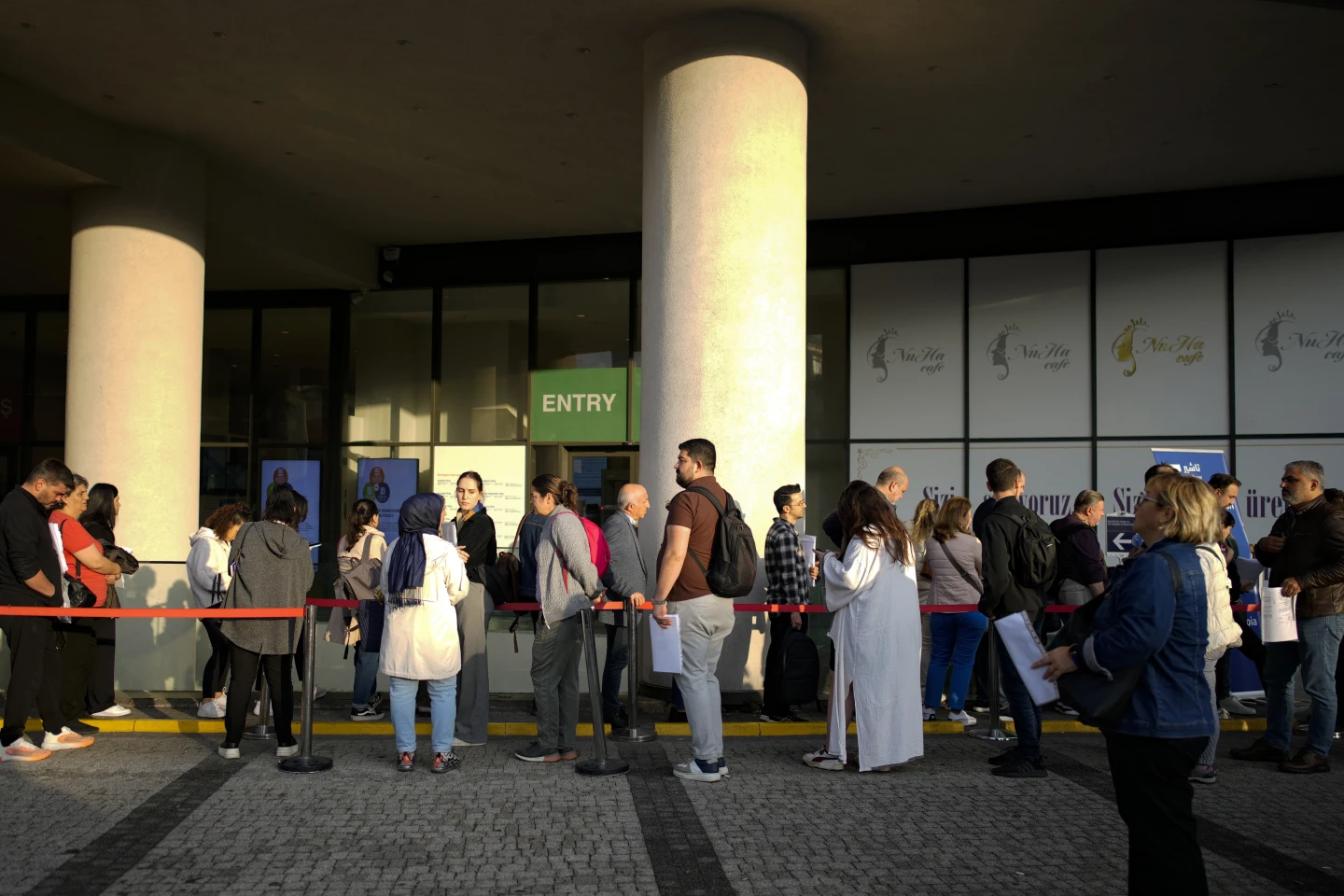Rising brain drain in Türkiye: Why is top talent fleeing to West?
 Medicine university students take part in a parade during celebrations marking the 100th anniversary of the creation of the modern secular Turkish Republic, in Istanbul, Türkiye, Oct. 29, 2023 (AP Photo)
Medicine university students take part in a parade during celebrations marking the 100th anniversary of the creation of the modern secular Turkish Republic, in Istanbul, Türkiye, Oct. 29, 2023 (AP Photo)
In 2024, the brain drain rate among higher education graduates in Türkiye reached 2%, with graduates primarily opting to move to the United States.
The Turkish Statistical Institute (TurkStat) has released statistics on higher education brain drain covering the period from 2021 to 2023. The data reveals that the brain drain rate for higher education graduates was 1.6% in 2015 and will increase to 2% by 2023. The rate for women stands at 1.6%, while for men, it is 2.4%.
Highest brain drain by field
- Information and communication technologies (ICT): 6.8%
- Engineering, manufacturing and construction: 4.4%
- Natural sciences, mathematics and statistics: 2.6%
Highest brain drain by Bachelor’s programs
- Molecular biology and genetics: 17.9%
- Biomedical engineering: 10.2%
- Industrial engineering: 9.8%
- Electronic engineering: 9.1%
- Mathematics Engineering: 8.9%
- Computer Engineering: 8.4%

Destinations for graduates
Graduates completing a bachelor’s program preferred the United States for migration, with 21.4% choosing this destination. The United States is followed by Germany at 17.5%, the United Kingdom at 11.2%, the Netherlands at 6.9%, and Canada at 4.9%.
Among graduates migrating to the U.S. and Canada, business graduates constitute the largest group, while computer engineering graduates predominantly choose Germany, the U.K. and the Netherlands.

Nearly 49,000 graduates now abroad
TurkStat has not specified the age group included in its higher education brain drain statistics, nor has it revealed how many young people are currently abroad. However, according to the Council of Higher Education (YOK), 2,442,039 individuals graduated with a bachelor’s degree from universities in Türkiye between 2008 and 2017 (excluding open and distance education). With a 2% brain drain rate, this equates to 48,841 individuals.
According to YOK data from 2022, 47,602 university graduates left Türkiye between 2007 and 2016, indicating that the brain drain increased in 2023 compared to 2022. A report by the Istanbul Policy Center in 2020 indicated that 59% of individuals migrating from Türkiye had received higher education.

Rising number of engineers and geneticists leaving
The latest data from TurkStat shows that the fields with the highest brain drain are ICT (6.8%), engineering, manufacturing, and construction (4.4%), and natural sciences, mathematics and statistics (2.6%).
From 2008 to 2017, 17.9% of molecular biology and genetics graduates, 10.2% of biomedical engineering graduates, 9.8% of industrial engineering graduates, 9.1% of electronic engineering graduates, 8.9% of mathematics engineering graduates, and 8.4% of computer engineering graduates moved abroad.

Youth unemployment hits 19.5% in Türkiye
According to official data, the unemployment rate among individuals aged 15-24 in Türkiye was 19.5% as of July. The youth unemployment rate fluctuated between 25% and 30% from 2008 to 2010 but has remained between 19% and 21% since 2010.
Speaking to DW Turkish, professor Ayse Nilufer Narli, head of the Sociology Department at Bahcesehir University, indicated that economic factors such as unemployment and low salaries are primary drivers of brain drain. Limited job opportunities for university graduates are one of the triggers for migration.
Narli emphasized that average salaries in Türkiye are significantly lower compared to Western Europe, the United States, and Canada. “Therefore, young people are heading to countries in Western Europe and North America, where they can work for more satisfactory salaries in their fields,” she stated.
She pointed out that economic instability and inflation create a sense of uncertainty among individuals, leading them to believe that their salaries will continually decrease, making it impossible to save.

Concerns over democratic rights fuel migration
The political climate in Türkiye, particularly concerns about freedom of expression and democratic rights, is also a significant factor driving brain drain. Türkiye is categorized as a “Not Free” country in the 2023 Freedom Index by the U.S.-based think tank Freedom House.
In the 2023 report by the Sweden-based International IDEA, Türkiye ranked 148th among 173 countries in terms of the rule of law, while the Reporters Without Borders (RSF) 2023 Press Freedom Index placed Türkiye 165th out of 180 countries.
Professor Ayhan Kaya from Istanbul Bilgi University noted that the early 2000s were years of brain drain for Türkiye, where individuals preferred to live in Türkiye due to democratization and European integration effects.
Cultural restrictions play a role
According to Narli, opportunities in Türkiye are limited for those working in scientific fields. Young entrepreneurs express that they do not find sufficient investment and support to implement their innovative ideas.
She noted that many young individuals feel they face various cultural and social restrictions, which pushes them to seek work abroad. “Looking at YOK data, we see that over 10,000 academics have left Türkiye in the past five years, generally from younger age groups,” she explained.
Moreover, there are many high school graduates seeking better educational opportunities abroad, as they believe they can receive higher-quality education in Western Europe and the United States. “The brightest students are leaving to study abroad,” Narli added.
In 2022, it was reported that 42% of the population migrating from Türkiye was aged 20-34, with a significant portion being highly educated and university graduates.

How to reverse brain drain?
According to professor Ayhan Kaya, initiatives by the Ministry of Labor, TUBITAK, and YOK aimed at reversing brain drain and attracting foreign brain drain were somewhat successful in the early 2000s but lost momentum after the 2010s.
Kaya pointed out that scholarship opportunities provided by Türkiye to attract brain drain from the West primarily benefit students from regions such as Africa, Pakistan, and Bangladesh, indicating the types of individuals who prefer Türkiye’s lifestyle.
Kaya remains optimistic about the young individuals leaving Türkiye. “When there is political change in Türkiye and the European Union integration process is revitalized, it is possible to say that these individuals will return to their countries and continue their lives from here,” he stated, adding, “However, this requires the right policies to be developed.”
The ongoing brain drain among higher education graduates in Türkiye poses significant challenges for the nation’s future. As more talented individuals seek opportunities abroad, Türkiye must address the underlying economic, social, and political issues that drive this migration.
By fostering a more favorable environment for education, employment, and democratic rights, the country can hope to retain its brightest minds and cultivate a thriving, innovative society.



